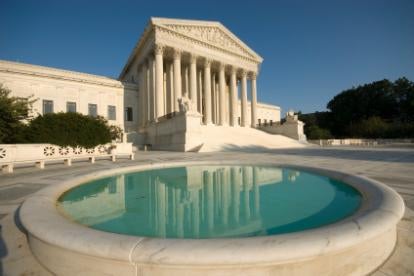Goodyear Tire & Rubber Co. v. Haeger, 581 U.S. ___ (2017)
In this rare opinion from our Supreme Court addressing discovery, the court considered “a federal court’s inherent authority to sanction a litigant for bad-faith conduct by ordering it to pay the other side’s legal fees.” The court held that “such an order is limited to the fees the innocent party incurred solely because of the misconduct—or put another way, to the fees that party would not have incurred but for the bad faith.” Because neither the trial court nor the appellate court applied the correct legal standard, the judgment of the Court of Appeals (9th Cir.) was reversed and the case remanded for further proceedings.
Plaintiffs sued Defendant after their motorhome swerved off the road and flipped. Plaintiffs alleged the accident was caused by the failure of their Goodyear tire. In the course of discovery, Plaintiffs repeatedly sought disclosure of Defendant’s internal test results related to at-issue tire, but “responses were both slow in coming and unrevealing in content.” Ultimately, the case settled.
Several months later Plaintiffs’ counsel read in the newspaper about test results disclosed in a separate litigation involving the same model tire—which he had never seen. The test indicated that the at-issue tire model “got unusually hot” at certain speeds, which had been Plaintiffs’ theory all along. Defendant conceded withholding the information.
Plaintiffs sought sanctions for discovery fraud, specifically payment of their attorney’s fees and cost “expended in the litigation.” The District Court, reasoning that no statute or rule “enabled it to reach all the offending behavior” granted Plaintiffs’ motion pursuant to its inherent authority. Moreover, despite acknowledging the usual need to limit such an award to expenses caused by the offending behavior, the court justified its authority to award a greater amount based on the egregious behavior of Defendant and its determination that disclosure of the test results would “more likely than not” have allowed settlement much earlier. Ultimately, the court awarded $2.7 million to account for Plaintiffs’ legal costs “since the moment, early in the litigation, when Goodyear made its first dishonest discovery response.” Notably, in the event the Circuit Court required a causal connection, the court also made a “contingent award” of $2 million, reducing the award to exclude $700,000 based on costs associated with developing claims against other defendants and proving Plaintiffs’ medical damages. On appeal, the Ninth Circuit affirmed the full $2.7 million award. This created a split of authority for the Supreme Court to resolve.
Summarizing broadly, the Supreme Court confirmed that federal courts possess inherent authority to impose sanctions “for conduct which abuses the judicial process” and that one such sanction is the “assessment of attorney’s fees.” However, the court made clear that such an award “may go no further than to redress the wronged party ‘for the losses sustained’; it may not impose an additional amount as punishment . . . .” “That means, pretty much by definition, that the court can shift only those attorney’s fees incurred because of the misconduct at issue.” The court further explained that “[t]hat kind of causal connection . . . is appropriately framed as a but-for test . . . .” Thus, a complaining party may recover “‘only the portion of his fees that he would not have paid but for’ the misconduct.”
In the present case, the court reasoned, neither of the lower courts used the “correct legal standard.” The District Court, for example, “specifically disclaimed the ‘usual[ ]’ need to find a ‘causal link’” between the misconduct and the fees awarded in light of the seriousness of the misconduct and possible effect (delay) on settlement. The Circuit Court, for its part, also “mistook what findings were needed to support [the] award” when it concluded that the trial court could grant all fees incurred “during the time” of Defendant’s bad behavior—a “temporal limitation, not a causal one . . . .”
Ultimately, the court reversed the judgment of the Circuit Court and remanded the case for further proceedings.


 i
i


